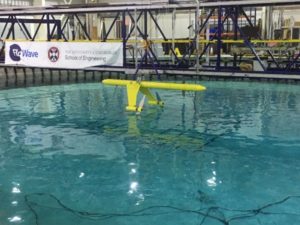At Orbital we are constantly striving to reduce the generating cost of tidal stream energy through incorporating ongoing innovations into our O2 technology. It is important that these innovations are developed with a view to the full range of metocean conditions from tidal stream sites around the world as these environments are extremely complex, with strong currents and waves coming from varying directions.
Despite having developed our proprietary floating turbine for over 15 years, and having also built the most powerful tidal turbine, the O2 2MW; scale model testing continues to play an integral role in rapidly and cost-effectively trialling ongoing optimisations to the overall design.
Recently, with funding support from the INTERREG France (Channel) England TIGER project, our hydrodynamics team have been at the FloWave Ocean Energy Facility, operated by the School of Engineering at the University of Edinburgh, to test 1/20th scale models in a programmable and controllable test basin environment. FloWave possesses a number of unique capabilities for scaled testing with a circular basin comprising 168 wavemakers and 28 current generators and containing over 2.4 million litres of water allowing for the recreation of complex multi-directional sea states not found in any other tank facility in the world.

The testing campaign has allowed us to trial different low-cost mooring configurations for a wide range of sites and provided data to inform the development of even more powerful powertrains and rotor sizes for our O2 tidal technology while ensuring platform stability across the worst possible combinations of wave and current scenarios including 100-year storms conditions.
The activities also form part of Orbital’s overall €5m R&D and engineering programme with resulting innovations to be rolled out on a continuous basis on future O2 units as Orbital transitions to becoming the leading global supplier of tidal energy solutions.
Project: TIGER (Tidal Stream Industry Energiser)
Timescale: 2019 – 2023 (47 months)
Funder: Interreg France (Channel) England Programme
Funding: ERDF funding € 29 million / Total project budget € 45. million



